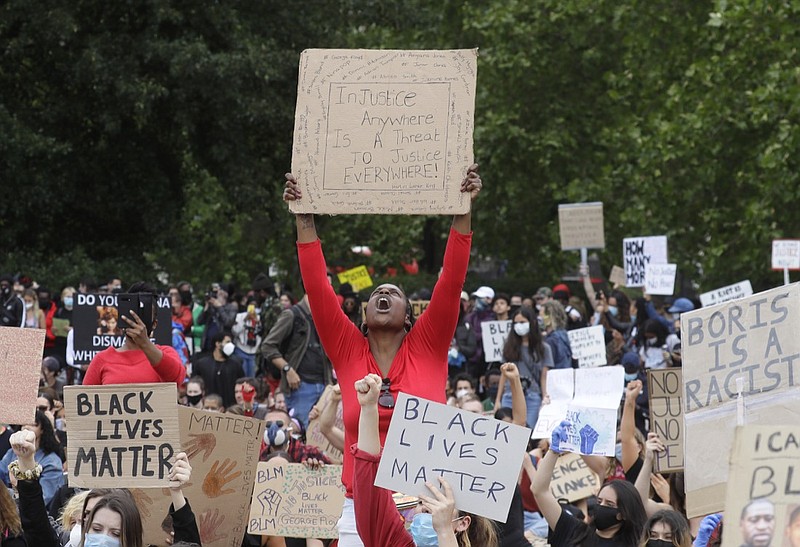LONDON (AP) - Thousands of people demonstrated in London on Wednesday against police violence and racial injustice following the killing of George Floyd in Minneapolis, which has set off days of unrest in the United States.
Chanting "Black lives matter," thousands gathered in Hyde Park, central London's biggest open space and a traditional protest venue. Many of them passed through barriers at the park and marched through the streets, blocking traffic. There were no signs of violence, although some sprayed graffiti on walls.
Some protesters converged on Parliament and the nearby office of Prime Minister Boris Johnson at 10 Downing St. Others headed south of the River Thames.
"Star Wars" actor John Boyega, who was born in Britain to Nigerian parents and grew up in south London's Peckham neighborhood, pleaded tearfully for demonstrators to stay peaceful.
"Because they want us to mess up, they want us to be disorganized, but not today," he said.
Boyega recalled the case of Stephen Lawrence, an 18-year-old black man from southeast London who was stabbed to death in 1993 as he waited for a bus. The case against his attackers collapsed in 1996, and a government report cited institutional racism on the part of the London police force as a key factor in its failure to thoroughly investigate the killing.
"Black lives have always mattered," Boyega said. "We have always been important. We have always meant something. We have always succeeded regardless and now is the time. I ain't waiting."
Police appeared to keep a low profile during the demonstration and the ensuing marches.
Earlier, the U.K.'s most senior police officer said she was "appalled" by Floyd's death and "horrified" by the subsequent violence in U.S. cities. Floyd died May 25 after a white Minneapolis officer, Derek Chauvin, pressed his knee on the handcuffed black man's neck for several minutes.
"I do want to reassure people in London ... that we will continue with our tradition of policing, using minimum force necessary, working as closely as we possibly can with our communities," Metropolitan Police Commissioner Dame Cressida Dick told the London Assembly police and crime committee.
"Met officers and staff are highly professional, they're very well trained, they're very restrained and they're also very, very highly scrutinized, something we don't flinch from at all," Dick said.
While the London protesters expressed solidarity with Americans protesting Floyd's death, many also pointed to issues closer to home. "Racism is a pandemic," said one placard at the London demonstration.
Other protests are taking place around the world, including in Cape Town, South Africa, and in Reykjavík, Iceland.
In Cape Town, about 20 people gathered at the gates of the parliament complex and held up signs with the slogans of "Black Lives Matter" and "Justice 4 George Floyd and Collins Khosa."
Khosa is died a month ago after being confronted by soldiers and police in Johannesburg's Alexandra township. Family members say he died hours after he was choked and beaten.
A South African army investigation cleared the soldiers of wrongdoing, but lawyers for Khosa's family say they will challenge those findings.
The London demonstrators appeared to ignore coronavirus social distancing guidelines in the U.K., where people have been told to stay 2 meters (6 feet) apart.
Some of them carried placards saying "Justice for Belly Mujinga," a 47-year-old railway station worker who died of coronavirus in April, weeks after an incident in which she said she was coughed and spat upon by a customer who claimed to be infected.
Her death has come to symbolize the high toll the virus has taken on ethnic minority Britons and front-line workers -- and, for some, social injustice. Police did not bring charges against the man accused of confronting Mujinga, saying an investigation had shown he did not infect her and there was no evidence to substantiate a criminal offense.
The coronavirus outbreak has exposed divisions and inequalities within the U.K. A government-commissioned report Tuesday confirmed that ethnic minorities in Britain experienced a higher death rate from the coronavirus than whites.
Figures from London's Metropolitan Police also show that black and ethnic minority Londoners were more likely than their white counterparts to be fined or arrested for breaking lockdown rules barring gatherings or nonessential travel.
Metropolitan Police figures show that black people received 26% of the 973 fines handed out by police between March 27 and May 14, and accounted for 31% of arrests. They make up about 12% of London's population. People from Asian, black, mixed and other backgrounds received more than half of the fines and arrests, but account for about 40% of the city's population.
The police force said the reasons for the discrepancy were "complex." But Owen West, a former police chief superintendent, said racism was a potential factor.
"The U.K. police service has massive issues with discrimination and I really do think now is the time to confront it," he told the BBC.
